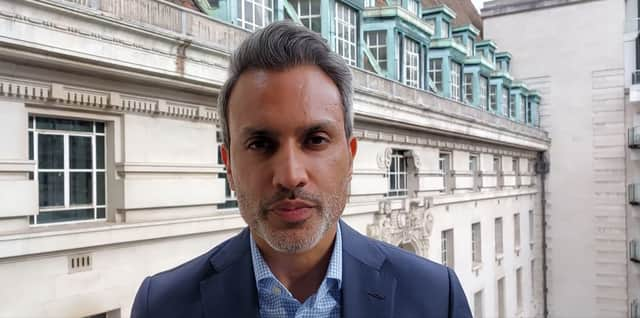Israel-Hamas war: Young Muslim and Jewish people scared of going out at night, warns youth programme chief
and live on Freeview channel 276
A youth programme leader in London has warned young Muslim and Jewish people are scared to go out at night due to the conflict in the Middle East.
Faheem Khan, founder of the Future Leaders programme and assistant headteacher at Woodbridge High School, said despite safe spaces being available, many affected by the Israel-Hamas war are "worried and concerned" in the capital.
Advertisement
Hide AdAdvertisement
Hide AdThe Met Police announced last month that cases of antisemitism and Islamophobia in London had risen by 1,353% and 140% between October 1 and October 18, compared to the same period last year. Several Jewish schools have also had to temporarily shut due to concerns about student safety.
The Future Leaders programme, which is backed by the mayor’s Shared Endeavour Fund, works with young people aged 16 to 18 in weekly sessions over the course of a year.
Mr Khan said that “through those weekly sessions we educate young people about the different types of hate and intolerance that exist in our community, we engage them to feel a deep sense of civic responsibility to want to counter that, and we empower them to be advocates for community cohesion, equality and diversity”.


Speaking to LondonWorld at an event organised by several anti-hate and anti-discrimination projects, Mr Khan said the focus for Future Leaders currently is the conflict in the Middle East.
Advertisement
Hide AdAdvertisement
Hide Ad“Just last night [November 2] we had a session where we connected via Zoom with an Israeli that lives 30 minutes from the Gaza border and a Palestinian that lives in the West Bank, and our young people heard first-hand accounts from these people who live in the region about what the impact has been for them and what we can do on this side of the world to help them and to achieve peace,” he said.
He added he has found young people who are part of the programme, both Jewish and Muslim, are currently scared to go out at night, and that global events are creating polarisation among communities in the capital.
On how Future Leaders can help in such instances, Mr Khan said: “We bring together very different young people to build empathy, to build cohesion and to build unity. It’s a safe space for them to have some of those difficult conversations that they may not be able to have at school or at home, and through those you build that kind of community cohesion that allows them to go out and be ambassadors and further that work and create that ripple effect that leads to unity.”
Future Leaders was not the only project at the event supported by the mayor’s Shared Endeavour Fund, which offers grants to schemes countering extremism in London, with each of those present having received backing.
Advertisement
Hide AdAdvertisement
Hide AdThe mayor himself, Sadiq Khan, even made an appearance, sitting in on some of the workshops run throughout the morning.
Commenting on the conflict and its impact on Londoners, Mr Khan called for those who are not Jewish or Muslim in the capital to show allyship with those affected.
“One of the things that I think is really important is for those that aren’t Jewish, those that aren’t Muslim show allyship, empathy, solidarity with those that are,” he said.
“How many of us know, for example, that normally there are some schools that require protection, CCTV, security guards for no other reason than they’re Jewish schools? How many people know there are some places of worship in our city that require security, CCTV, protection for no other reason but because they’re synagogues?
Advertisement
Hide AdAdvertisement
Hide Ad“And so understanding that makes you a better neighbour, colleague and friend, but is also really reassuring for those Jewish Londoners as well.”
A pro-Palestine march is expected to go ahead this Saturday (November 11), Armistice Day, despite requests by the government and the Met Police for the organisers to call it off.
The coalition of groups behind it, which includes the Palestine Solidarity Campaign and the Muslim Association of Britain, have refused, pointing to the Met’s admission the protests so-far have been “overwhelmingly peaceful with low levels of arrest”.
Comment Guidelines
National World encourages reader discussion on our stories. User feedback, insights and back-and-forth exchanges add a rich layer of context to reporting. Please review our Community Guidelines before commenting.
